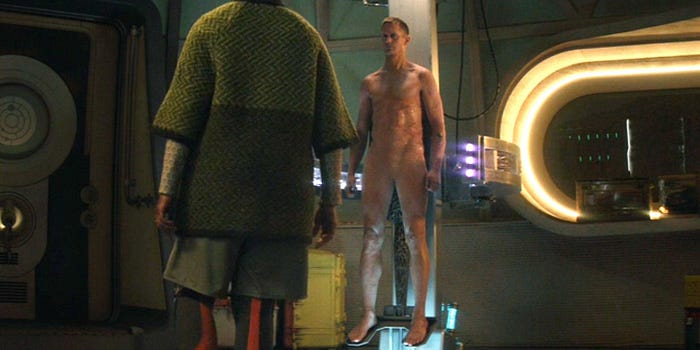Television | Science Fiction
When I heard that Apple TV was adapting Martha Wells' quirky sci-fi novella The Murderbot Diaries, I was excited… but then I was concerned. I wanted to see SecUnit, a.k.a. the titular Murderbot done right. Murderbot is such a deeply complicated but relatable character, a breath of fresh air in a genre where AI and other artificial constructs are often worshipful of humanity and just want to be real boys.
Murderbot doesn't want to be human. It — yes, "it" — is also not a boy. It is a rogue Security Unit.
How would TV handle a genderless "it" like Murderbot?
Skarsgård as Murderbot
The Murderbot Diaries tells the story of a Security Unit, a kind of AI-powered android super soldier, that has hacked its governor module. This means it has gone rogue, but rather than going on a killing spree, the self-named Murderbot decides to use its freedom to watch 35,000 hours of media.
Anyone could have been cast to play Murderbot. The character is genderless and uses the pronoun "it." In an interview with Interstellar Flight Magazine, author Wells said, "I think our society has trained people to assign gender, especially a binary gender, to everything, and hopefully reading about Murderbot will make people a little more aware of that cultural programming."
As Wells pointed out, readers — and now watchers — are wont to assign a gender to the character, especially depending on how they consume the media. Readers might think of a sarcastic, put-upon addict of soapy television as a feminine entity. I listened to the series on audiobook, narrated by Kevin R. Free, and thus my interpretation of Murderbot skewed masculine.
Now that the undeniably masculine, six foot-something Alexander Skarsgård is playing the character, both viewers and in-universe characters have been gendering the genderless Security Unit as "he."
Should someone more androgynous been cast to play Murderbot? Should a non-binary actor have been chosen to play an agender character?
There has been a lot of debate online regarding this, with some people feeling that the casting was a missed opportunity for sorely needed non-binary representation. Others have expressed that agender people do not need to present as androgynous, and thus the masculine-presenting Murderbot is a good choice. SecUnits are supposed to be intimidating body guards, so building them as big, tall men pulled straight from a first person shooter makes sense, right?
In my humble opinion (that is perhaps influenced by originally listening to Kevin R. Free's gravelly, sardonic narration) Skarsgård works well as Murderbot. He is tall and intimidating, embodying a SecUnit, and he has this blank, somewhat constipated expression that matches Murderbot's perpetual discomfort.
In the end, not everyone has to be happy with the TV adaptation's choice in casting, but it certainly has made people — as Wells mentioned — more aware of cultural programming regarding gender.
Murderbot is not a man
In-universe, the characters in Murderbot are sometimes at a loss as to how to refer to their new Security Unit. At first, they slip up and say "he" before catching on that the SecUnit is an "it."
Similarly, reviews of the first few episodes have been confused as to how to refer to the character. The Guardian's review of the first episode initially used he/him pronouns in reference to Murderbot, but quickly amended to it/its. This Forbes review waffles back and forth between saying "he" and "it," acknowledging that the characters are sometimes thrown off by the human face beneath Murderbot's helmet.
As if to address this inevitable issue, the show went to unprecedented (at least, not precedented in the novella series) lengths to show viewers that Murderbot is not a human man. It is not even an inhuman male.
In an excruciatingly awkward scene, de facto leader Dr. Mensah talks with Murderbot while it is getting put back together in its repair cubicle after half its middle got chomped by an alien creature. It is totally naked, no armor or helmet, and it is… smooth. Like a Ken doll.

(Fun fact: Skarsgård said he decided to be totally hairless for the role, which he ultimately called a "stupid choice" because it meant a whole lot of waxing over six months.)
In the words of Martha Wells, "When I was working on the first novella, it didn't seem logical that a SecUnit would be given any kind of reproductive system or any human parts that weren't directly useful for its security function."
There are constructs within the series that have those kinds of human parts, but they are Comfort Units — Sex Bots. Murderbot is repulsed by the idea of having sex and skips through love scenes while watching media: "I had seen humans having sex on the entertainment feed and on my contracts when I had been required to record everything the clients said and did. No, thank you, no. No."
Gender is for organics
Murderbot is an asexual, agender, inhuman construct. While this isn't a totally new concept within the science fiction genre, centering the narrative on the thoughts and feelings of this inorganic bot is. Androids are a core staple of sci-fi, but they are typically side characters — side characters that default to male pronouns at that.
Why are androids like Data, Bishop, and C-3PO male? What about R2-D2 and BB-8?
Even if the androids aren't humanoid, they still get placed in the gender binary. It has been interesting, therefore, to see new fans come to terms with calling someone an "it." While accurate to the way Murderbot thinks of itself, it/its pronouns can just feel wrong, maybe even rude.
But Murderbot is ultimately an "it." In its own words, "gender is for organics."

